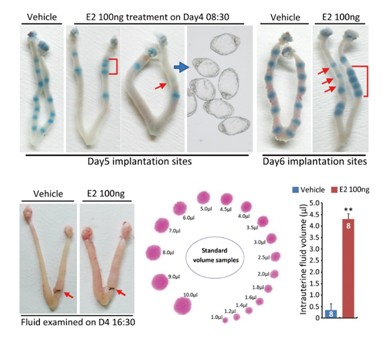In mammalian species, embryo implantation is the threshold for pregnancy establishment, the abnormality of which accounts for ~75% of human pregnancy loss. Abnormal preimplantation hormonal environment is a common cause for defective embryo implantation, usually attributed to the changed endometrium receptivity. Here, a research group lead by Prof. EnkuiDuan at institute of Zoology, Chinese Academy of Sciences, showed that the abnormal preimplantation hormonal environment also disrupt intrauterine fluid homeostasis that constitute a major cause for impairedembryo implantation.
Using a uterine horn ligation model in mice, the research group showed that a supraphysiological estrogen at preimplantation (day 4 postcoitus) will cause excessive intrauterine fluid accumulation, which isa major cause for abnormal embryo implantation and subsequent pregnancy loss. The hyper-estrogen induced intrauterine fluid accumulation was found associating with a simultaneous, abnormal up-regulation of two uterine water channels, Aquaporin-5 and -8 (AQP5, 8), which arose on the apical surface (the secretion side) of glandular epithelium. By genetic deletion of Aqp5, Aqp8 or both in mice, the abnormal intrauterine fluid increase could be efficiently prevented, and the implantation status could be largely corrected, which indicated uterine AQP5/8 was directly responsible for the excessive uterine fluid accumulation under the supraphysiological estrogen environment. Moreover, the researcher showed that a progesterone co-injection at preimplantation could neutralize the adverse effects of hyper-estrogen and improves implantation by limiting uterine AQP5/8 upregulation and preventing excessive uterine fluid accumulation.
These findings revealed that Aquaporin-dependent excessive intrauterine ?uid accumulation is a critical cause of implantation failure aside from the well-recognized factors of endometrial receptivity.It also have clinical implications because aquaporins are also dynamically expressed in human endometrium.
These results are recently published in Cell Researchentitled: “Aquaporin-dependent excessive intrauterine fluid accumulation is a major contributor in hyper-estrogen induced aberrant embryo implantation.”
Article link:http://www.nature.com/cr/journal/vaop/ncurrent/full/cr2014139a.html

Pre-implantation hyper-estrogen cause intrauterine fluid accumulation and abnormal embryo implantation

